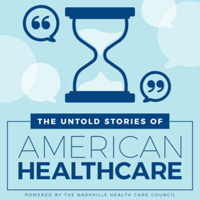Episode 1: The Pandemic Economy
Dr. Naomi Rogers, professor of the history of medicine in the section of the history of medicine and the program in the history of science and medicine at Yale University, and Nick Diamond, advisor and legal academic discuss some of the similarities between COVID-19 and the 1918 pandemic, along with the long-term impact this pandemic will have on American society.
COVID-19 may be the deadliest pandemic in American memory, but just over 100 years ago, Nashville was almost equally affected by the Influenza pandemic. With 50,000 cases in Nashville in just two months, the 1918 pandemic provides rich insight into the ways that major health crises have impacted our society in the past and will likely inform our future.
In this episode of The Untold Stories of American Healthcare, host Ryann Petit-Frere talks with medical history scholar Dr. Naomi Rogers and advisor and legal expert Nick Diamond about the history of pandemics in the U.S. and the lasting changes we can expect to see after COVID-19.
Lessons From the 1918 Pandemic

Until COVID-19 turned American society upside down, many people thought the U.S. didn’t have to worry about infectious diseases.
“The whole idea that an infectious agent could profoundly transform American society, American culture and the American economy was really something that very few people believed in,” Dr. Naomi Rogers explained. “That was a disease that impoverished countries or maybe small communities within the United States were still battling, but everybody felt sure that they would come through as part of increasing progress.”
Dr. Rogers has spent much of her career writing and teaching about medical history, and she understands that people want to move on and forget about crises like pandemics. However, she hopes that people will make an effort to memorialize COVID-19.
After 1918, “People forgot. They knew that there’d been a pandemic, but they didn’t remember what had happened. It was almost as if it hadn’t happened at all,” she shared. “I would actually really like us as a society to start to think about how we want to remember this.”
Dr. Rogers also pointed out that, just like in 1918, COVID-19 has shone a spotlight on issues of inequity in our country, providing us with an opportunity to address some of those issues in new ways.
“I hope, actually, that with the devastation of COVID-19, that it will enable us to be able to think more broadly about inequities in so many parts of our communities,” she said. “It’s not that there weren’t inequities before. There were, but they had been hidden just a little bit, enough for people to have been able to just continue their lives. COVID-19 has made so much of that almost impossible.”
Reshaping Health Care for the Future

COVID-19 has emphasized some of the biggest issues in the healthcare industry, but it’s also created a unique opportunity for innovation. Nick Diamond, an expert in global health policy and public health law, believes the pandemic will prompt an important shift toward more preventative care.
“Our contemporary healthcare system places arguably a disproportionate emphasis on therapeutic care versus preventative care. And this is something providers, specifically primary care providers, have pressed on for a long time,” he explained.
Not only should this include promoting primary care and vaccines, but also an increased emphasis on the social determinants of health, such as housing, access to providers and more, Diamond argued.
“Certain parts of society have been hit harder than other parts of society,” he shared. “We’ve seen certain urban areas hit harder. We’ve seen rural areas hit harder, but later in the trajectory of the pandemic. We see the economic impacts as well, being very different across different subsets of society.”
And since healthcare and the wider economy are so closely intertwined, Diamond believes that policymakers and other influential people will have more motivation than ever to focus on staying prepared and preventing or minimizing major health crises in the future.
“That’s something that here in the U.S., the federal government can drive, but that’s something also [that] the state and local levels can be partners in,” he shared.
To learn more about the Nashville Health Care Council and follow along on our journey through the Untold Stories of American Healthcare, visit healthcarecouncil.com. And be sure to subscribe, rate and review this show wherever you get your podcasts.

